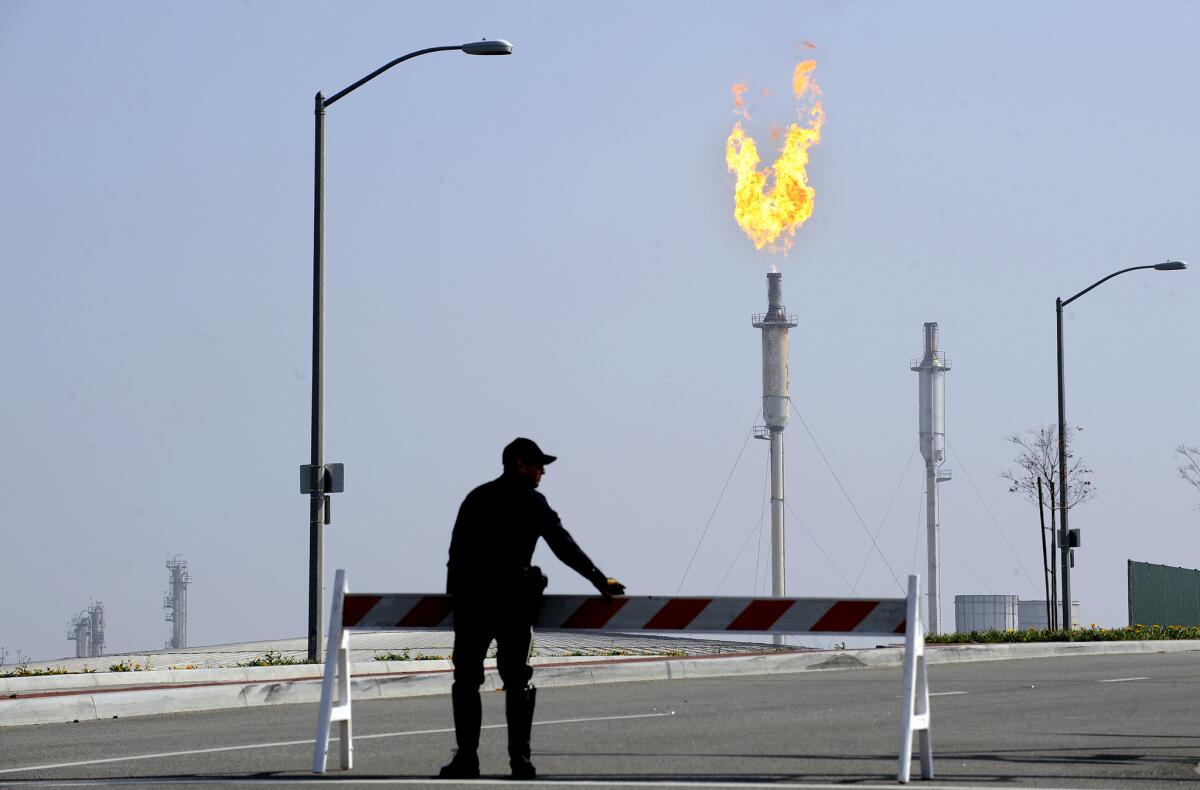Four injured by large blast at Torrance refinery

- Share via
A large explosion Wednesday at the Exxon Mobil refinery in Torrance sent flames into the air, injuring four and leaving residents with a stark reminder of the dangers that come with living in the South Bay’s refinery zone.
The blast occurred about 8:50 a.m., rattling residents, shattering some windows and forcing students at 14 nearby schools to remain indoors. Seismologists said the power of the blast was the equivalent of a magnitude 1.4 earthquake. It sent an ash-like substance into nearby neighborhoods.
When firefighters arrived at the refinery, Torrance Fire Capt. Steve Deuel said, they found flames probably fueled by gasoline.
Once the fire was extinguished, damage was revealed to portions of the refinery structure that were mangled by the explosion, which scattered debris and badly damaged two vehicles.
Still, the vast majority of the sprawling facility continued to operate as normal.
The cause of the blast has not been determined, but it occurred in one of the plant’s electrostatic precipitators, which are housed in a unit that had been shut down for maintenance in a process known as a turnaround, according to California Division of Occupational Safety and Health spokeswoman Erika Monterroza.
Standing 12 stories high and weighing more than 1,000 tons, the electrostatic precipitators reduce ammonia and particulate emissions and were installed to comply with environmental regulations imposed by the South Coast Air Quality Management District, according to company documents.
Cal/OSHA has shut down the fluid catalytic cracker, the larger unit that houses the affected equipment, citing the imminent hazard. Operations will resume when the company can demonstrate that it can safely run the unit — a process that could take days, weeks or months, Monterroza said.
Turnarounds are considered one of the most potentially dangerous processes at a refinery, which spurred state Sen. Loni Hancock (D-Berkeley) to propose SB 1300, a law approved in September that requires refineries to file schedules of planned turnarounds.
The law took effect Jan. 1, but employers aren’t required to submit documentation on turnarounds until June 15, Monterroza said.
No harmful emissions were detected, but the air quality district issued a smoke advisory for the area.
The refineries and other energy processing facilities that dot the South Bay have long been a looming presence. There have been fewer destructive incidents in recent years. But during the 1980s and 1990s, explosions and other accidents at refineries sparked protests and calls for stricter regulations.
In 1994, a gas explosion ripped through Mobil’s Torrance refinery, injuring 28 people, at least six of them seriously. In 1988, one person was killed and nine were injured in a blast at the refinery. Some of the injured suffered serious burns.
In 1985, two people were killed and 45 were injured when a chain of explosions from a gasoline processing pump tore through an Atlantic Richfield refinery in Carson, sending 5,000-degree flames hundreds of feet into the air.
Torrance officials said they were trying to keep Wednesday’s blast in perspective.
“There certainly is a level of concern by the community,” said Mayor Patrick Furey, who lives two blocks from the refinery. “Any time there’s an incident, it heightens our awareness.”
But Furey, who has lived in the South Bay city for more than 30 years, said he considers the explosion an anomaly — and credits Exxon with implementing safety and community awareness programs during the last two decades.
“We mandate that they run a safe and secure property,” Furey said. “To be a good neighbor within the city limits, they have to be that way.”
Gilbert Griego, 70, said he was watching television at home with his daughter-in-law and grandson when the house shook. He has lived near the refinery for about 65 years.
“My daughter-in-law thought it was an earthquake,” he said. “I didn’t think it was because I didn’t feel the ground move.”
But looking at the flames from his home, near Crenshaw and Del Amo boulevards, he said he’s seen worse.
He recalled a 1979 oil tank fire at the Mobil Oil facility behind his house that forced the evacuation of their neighborhood.
Times staff writers Tiffany Hsu and Rong-Gong Lin II contributed to this story.
More to Read
Sign up for Essential California
The most important California stories and recommendations in your inbox every morning.
You may occasionally receive promotional content from the Los Angeles Times.












